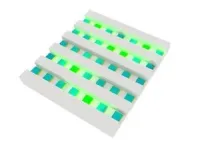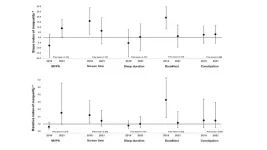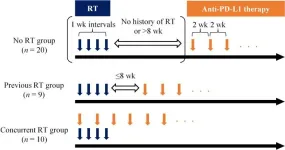(Press-News.org) A study of more than 8 million adults in Ontario, Canada suggests that even a modest loss of kidney function is associated with increased health risks. The study, published in The BMJ, could lead to better approaches to prevent chronic kidney disease and related conditions, particularly in younger adults.
“The dogma is that healthy, young adults don’t need to worry about kidney function unless it drops to around 50% of the normal level, but our research suggests that even a more modest 20-30% drop may have consequences and we may want to have earlier conversations about prevention and monitoring,” said senior author Dr. Manish Sood, senior scientist, nephrologist and Jindal Research Chair for the Prevention of Kidney Disease at The Ottawa Hospital and professor at the University of Ottawa.
The research team examined ICES health record data from 2008 to 2021 for every Ontario adult aged 18-65 who had at least one blood test for kidney function, but no history of kidney disease. They found that 18% of those in the 18-39 age group had kidney function that was modestly below normal levels, but not low enough to be diagnosed with chronic kidney disease. Individuals in this “grey zone” faced a modestly increased risk of kidney failure, death and cardiovascular events such as heart attack.
For example, in young adults (age 18-39), a 20-30% loss in kidney function was associated with a 1.4-fold increase in death, 1.3-fold increase in a cardiac event and a 6-fold increase in the risk of kidney failure. However, the absolute risk of any of these events was still low at less than 2 per 1000.
“Thankfully, the absolute risk for any one individual with kidney function in this grey zone is low, but when we look at the whole population, the impact could be quite significant,” said co-senior author Dr. Greg Knoll, senior scientist, nephrologist and Head of the Department of Medicine at The Ottawa Hospital and the University of Ottawa. “We need further research to confirm these findings and then see if we can reduce the risk through lifestyle modification.”
While the test for kidney function (blood creatine) is relatively inexpensive and readily available, the researchers are not suggesting routine testing for all individuals at this time. However, if an individual has had a kidney test that shows a modest reduction in function, it can be a catalyst for a conversation with a health care provider. All individuals can also reduce their risk of kidney disease by eating a healthy diet with lower salt, exercising regularly and limiting alcohol intake.
Dr. Sood and his colleagues previously developed the Project BigLife Chronic Kidney Disease calculator to help individuals calculate their kidney disease risk and see the impact of lifestyle changes. The calculator will continue to be refined as new research arises.
Full reference: Associations between modest reductions in kidney function and adverse outcomes in young adults: retrospective, population based cohort study. Junayd Hussain, Nicholas Grubic, Ayub Akbari, Mark Canney, Meghan J Elliott, Pietro Ravani, Peter Tanuseputro, Edward G Clark, Gregory L Hundemer, Tim Ramsay, Navdeep Tangri, Greg A Knoll, Manish M Sood. BMJ 2023;381:e075062. http://dx.doi.org/10.1136/bmj‑2023‑075062
Funding: The Ottawa Hospital Academic Medical Organization, The Ottawa Hospital, Jindal Research Chair for the Prevention of Kidney Disease (funded through The Ottawa Hospital Foundation).
Media contact: Jenn Ganton, jganton@ohri.ca, 613-614-5253
The Ottawa Hospital (TOH) is one of Canada’s top learning and research hospitals where we are guided by our vision to provide the world-class and compassionate care we would all want for our loved ones. Our multi-campus hospital, affiliated with the University of Ottawa, is home to the Regional Trauma Centre and Cancer Centre, and to discoveries that are adopted globally. Backed by generous support from the community, we are focused on reshaping the future of health care to improve the health of our diverse population of patients from Eastern Ontario, Western Quebec, and Nunavut. For more information about research at The Ottawa Hospital, visit www.ohri.ca.
ICES is an independent, non-profit research institute that uses population-based health information to produce knowledge on a broad range of healthcare issues. Our unbiased evidence provides measures of health system performance, a clearer understanding of the shifting healthcare needs of Ontarians, and a stimulus for discussion of practical solutions to optimize scarce resources. ICES knowledge is highly regarded in Canada and abroad and is widely used by government, hospitals, planners, and practitioners to make decisions about care delivery and to develop policy. For the latest ICES news, follow us on Twitter: @ICESOntario
The University of Ottawa is home to over 50,000 students, faculty and staff, who live, work and study in both French and English. Our campus is a crossroads of cultures and ideas, where bold minds come together to inspire game-changing ideas. We are one of Canada’s top 10 research universities—our professors and researchers explore new approaches to today’s challenges. One of a handful of Canadian universities ranked among the top 200 in the world, we attract exceptional thinkers and welcome diverse perspectives from across the globe. www.uottawa.ca
END
Even a modest reduction in kidney function increases health risks in young adults
2023-06-23
ELSE PRESS RELEASES FROM THIS DATE:
Forensic bitemark analysis for court trials is not supported by sufficient data and “is leading to wrongful convictions”
2023-06-23
The commonly-used evidence in trials, bitemark analysis, is not backed up by scientific research – an analysis of current literature, and 12 new studies, shows.
Published in the peer-reviewed Journal of the California Dental Association, the research suggests 26 people have been wrongfully convicted, and some even sentenced to death, from the use of this forensic science.
“The scientific community does not uphold the underlying premises that human teeth are unique and their unique features transfer to human skin,” states lead author Mary Bush, Associate Professor at the State University of New York in Buffalo, NY.
“We find bitemark transfer ...
COVID-19's impact on socioeconomic inequality in health behaviors among Japanese adolescents
2023-06-23
Key Findings
This study is the first worldwide to investigate time trend in socioeconomic inequality in various health behaviors among adolescents before and during the COVID-19 pandemic.
The study found widening socioeconomic inequality among Japanese adolescents in achieving recommended physical activity levels before and during the pandemic, alongside narrowing inequality in breakfast intake. Specifically, despite no observed differences in physical activity by income in 2019, by 2021, adolescents from families with lower equivalent household incomes were less likely to engage in physical activity.
Research is needed to continue monitoring the impact these phenomena will have ...
More exposure needed for cosmetic breast enhancement risks
2023-06-23
Complications after cosmetic breast augmentation are more common than other cosmetic plastic surgery yet many women who undergo such procedures are often in the dark about the associated risks say QUT researchers.
The authors of a new paper argue the need for more disclosure early (and in much simpler terms) of those risks and the high likelihood of revision surgery being required so when women give their consent, they have a greater understanding of what may happen.
“The Australian cosmetic surgery industry is worth billions but there are concerns inside the industry on potential issues surrounding whether patients ...
Combination therapy effective against canine melanoma
2023-06-23
A combination of radiotherapy followed by immunotherapy is a promising strategy for the treatment of oral malignant melanomas in dogs.
Melanomas are the most common oral cancers in dogs. It is highly metastatic and conventional chemotherapy does not increase survival time. Canine oral melanomas are similar to human melanomas; thus, research is being conducted into adapting treatments developed for human melanomas for dogs.
A particularly effective therapy for treating human melanomas is a combination of immune checkpoint inhibitors and radiotherapy. A team of researchers led by Professor Satoru Konnai at Hokkaido University has investigated ...
Building the semiconductor workforce of the future
2023-06-23
The University of Utah is one of thirteen founding partner members of the Northwest University Semiconductor Network, a partnership with and created by Micron Technology, Inc. whose goal is to help develop the next generation of the United States’ semiconductor industry’s workforce.
Micron, one of the world’s largest semiconductor companies, made the announcement on Monday. In a press release the company stated the Northwest University Semiconductor Network will “drive foundational and emerging research to increase students’ ...
New rapid viral plaque detection system, aided by deep learning and holographic imaging, can help accelerate vaccine and drug development
2023-06-23
Findings
In a new paper published in Nature Biomedical Engineering, a team of scientists led by Professor Aydogan Ozcan from the Electrical and Computer Engineering Department at UCLA and an associate director of the California NanoSystems Institute, developed a rapid, stain-free, and automated viral plaque detection system enabled by holography and deep learning. This system incorporates a cost-effective and high-throughput holographic imaging device that continuously monitors the unstained virus-infected cells during their incubation process. At each imaging cycle, these ...
New ruling on care of dying will force some to live life “of machine-related suffering”
2023-06-23
The newly revised ruling on advance medical directives and withholding/withdrawing medical support for the dying in India will inevitably force some terminally ill patients to “live a life of machine-related suffering” and deprive them of their autonomy and dignity in death, suggest specialist doctors in a letter published online in the journal BMJ Supportive & Palliative Care.
While a progressive step, the 2023 ruling still has important shortcomings, they add.
In the absence of any specific legislation ...
Global diabetes cases to soar from 529 million to 1.3 billion by 2050
2023-06-23
***Embargo: 23.30 UK time / 18:30 ET / 15:30 PT Thursday, 22 June 2023***
SEATTLE, Wash. June 22, 2023 – More than half a billion people are living with diabetes worldwide, affecting men, women, and children of all ages in every country, and that number is projected to more than double to 1.3 billion people in the next 30 years, with every country seeing an increase, as published today in The Lancet.
The latest and most comprehensive calculations show the current global prevalence rate is 6.1%, making diabetes one of the top 10 leading causes of death and disability. At the super-region level, the ...
Surrey expert recognized on International Women in Engineering Day
2023-06-23
The Women’s Engineering Society has named the University of Surrey’s Dr Kelly Kousi as one of the finalists in its Top 50 Women in Engineering Awards (WE50) 2023: Safety and Security. The announcement coincides with International Women in Engineering Day 2023, a celebration of women in engineering.
Dr Kousi, a lecturer in the School of Chemistry and Chemical Engineering, leads a research group of scientists and engineers who work on emission control, synthetic fuel production ...
Gloss is less effective camouflage in beetles compared to matte, according to latest study
2023-06-23
When combined with iridescent colouration, a matt target surface appearance confers greater survival benefits in beetles than a glossy surface, scientists at the University of Bristol have found.
The findings, published in Behavioural Ecology, suggest that iridescence provides camouflage independent of glossiness, which means that it is the colour of iridescent surfaces and its changeability, that is the most important aspect of iridescence in enabling camouflage.
Iridescence is a type of structural colouration that produces bright, vibrant hues. These are often angle-dependent, meaning the observed colour appears to ...








